| Regular 9-orthoplex
Ennecross | |
|---|---|
 Orthogonal projection inside Petrie polygon | |
| Type | Regular 9-polytope |
| Family | orthoplex |
| Schläfli symbol | {37,4} {36,31,1} |
| Coxeter-Dynkin diagrams | |
| 8-faces | 512 {37} |
| 7-faces | 2304 {36} |
| 6-faces | 4608 {35} |
| 5-faces | 5376 {34} |
| 4-faces | 4032 {33} |
| Cells | 2016 {3,3} |
| Faces | 672 {3} |
| Edges | 144 |
| Vertices | 18 |
| Vertex figure | Octacross |
| Petrie polygon | Octadecagon |
| Coxeter groups | C9, [37,4] D9, [36,1,1] |
| Dual | 9-cube |
| Properties | convex, Hanner polytope |
In geometry, a 9-orthoplex or 9-cross polytope, is a regular 9-polytope with 18 vertices, 144 edges, 672 triangle faces, 2016 tetrahedron cells, 4032 5-cells 4-faces, 5376 5-simplex 5-faces, 4608 6-simplex 6-faces, 2304 7-simplex 7-faces, and 512 8-simplex 8-faces.
It has two constructed forms, the first being regular with Schläfli symbol {37,4}, and the second with alternately labeled (checkerboarded) facets, with Schläfli symbol {36,31,1} or Coxeter symbol 611.
It is one of an infinite family of polytopes, called cross-polytopes or orthoplexes. The dual polytope is the 9-hypercube or enneract.
Alternate names
- Enneacross, derived from combining the family name cross polytope with ennea for nine (dimensions) in Greek
- Pentacosidodecayotton as a 512-facetted 9-polytope (polyyotton)
Construction
There are two Coxeter groups associated with the 9-orthoplex, one regular, dual of the enneract with the C9 or [4,37] symmetry group, and a lower symmetry with two copies of 8-simplex facets, alternating, with the D9 or [36,1,1] symmetry group.
Cartesian coordinates
Cartesian coordinates for the vertices of a 9-orthoplex, centered at the origin, are
- (±1,0,0,0,0,0,0,0,0), (0,±1,0,0,0,0,0,0,0), (0,0,±1,0,0,0,0,0,0), (0,0,0,±1,0,0,0,0,0), (0,0,0,0,±1,0,0,0,0), (0,0,0,0,0,±1,0,0,0), (0,0,0,0,0,0,±1,0,0), (0,0,0,0,0,0,0,±1,0), (0,0,0,0,0,0,0,0,±1)
Every vertex pair is connected by an edge, except opposites.
Images
| B9 | B8 | B7 | |||
|---|---|---|---|---|---|
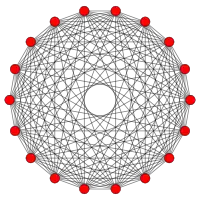 |
 |
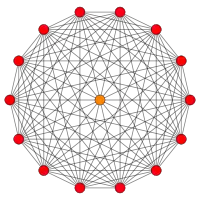 | |||
| [18] | [16] | [14] | |||
| B6 | B5 | ||||
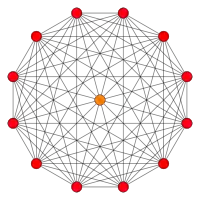 |
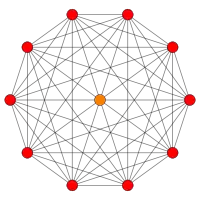 | ||||
| [12] | [10] | ||||
| B4 | B3 | B2 | |||
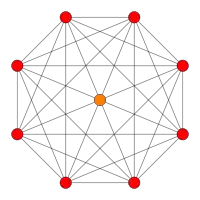 |
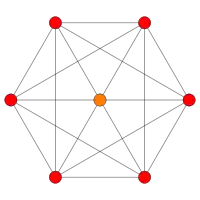 |
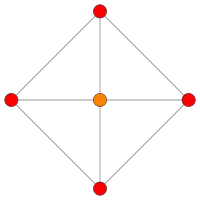 | |||
| [8] | [6] | [4] | |||
| A7 | A5 | A3 | |||
| — | — | — | |||
| [8] | [6] | [4] | |||
References
- H.S.M. Coxeter:
- H.S.M. Coxeter, Regular Polytopes, 3rd Edition, Dover New York, 1973
- Kaleidoscopes: Selected Writings of H.S.M. Coxeter, edited by F. Arthur Sherk, Peter McMullen, Anthony C. Thompson, Asia Ivic Weiss, Wiley-Interscience Publication, 1995, ISBN 978-0-471-01003-6
- (Paper 22) H.S.M. Coxeter, Regular and Semi Regular Polytopes I, [Math. Zeit. 46 (1940) 380-407, MR 2,10]
- (Paper 23) H.S.M. Coxeter, Regular and Semi-Regular Polytopes II, [Math. Zeit. 188 (1985) 559-591]
- (Paper 24) H.S.M. Coxeter, Regular and Semi-Regular Polytopes III, [Math. Zeit. 200 (1988) 3-45]
- Norman Johnson Uniform Polytopes, Manuscript (1991)
- N.W. Johnson: The Theory of Uniform Polytopes and Honeycombs, Ph.D.
- Klitzing, Richard. "9D uniform polytopes (polyyotta) x3o3o3o3o3o3o3o4o - vee".
External links
- Olshevsky, George. "Cross polytope". Glossary for Hyperspace. Archived from the original on 4 February 2007.
- Polytopes of Various Dimensions
- Multi-dimensional Glossary